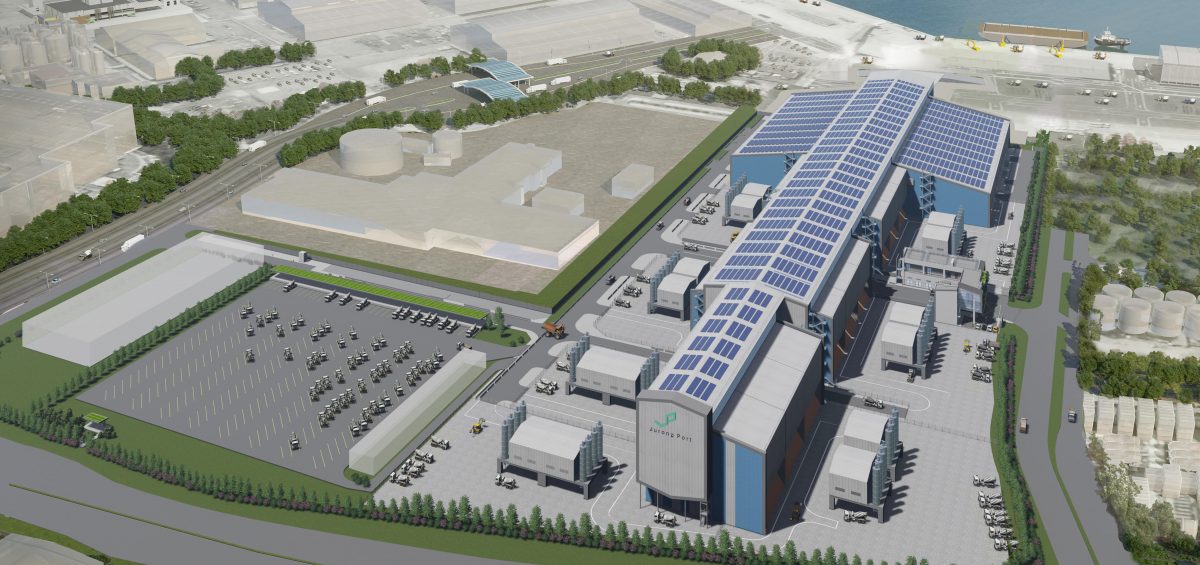SINGAPORE, 11 September 2020 – Jurong Port Pte Ltd, Singapore’s premier multipurpose port, has commenced construction of its Ready-Mixed Concrete (RMC) Port-Centric Ecosystem that will become a key logistics and manufacturing node for the construction sector in Singapore. Jurong Port (JP) is investing approximately $200 million to develop the RMC Ecosystem over the next three years.
Believed to be the world’s first-of-its-kind common user facility, the RMC Ecosystem will expect approximately 6 million tonnes of aggregates (i.e. sand and gravel) discharged from vessels at JP’s berths per annum. The aggregates, which are currently being discharged in western Singapore, will gradually transition in phases to be discharged at JP’s RMC Ecosystem.
The RMC Ecosystem is part of a larger construction ecosystem which includes cement and steel, both of which are currently discharged and handled at JP. The co-location of aggregates, cement and steel handling will enable shorter, leaner and greener supply chains for construction materials in Singapore. One efficiency in which JP expects to realise is the reduction of more than 600,000 truck trips annually, which currently take place due to the need for transportation of aggregates to batching plants. With the RMC Ecosystem, aggregates will be conveyed from JP’s berths to a fully enclosed storage and RMC batching facilities. In addition, with superior existing port infrastructure and deep-water berths, JP’s direct discharge capability can attract larger bulk vessels transporting aggregates from distant sources. This will also ensure competitive and sustainable cargo handling, encourage source diversification and strengthen supply chain resilience.
Designed to incorporate technologies and shared facilities such as advanced sludge recycling systems, the RMC Ecosystem is also expected to host solar photovoltaic panels capable of generating 3 to 4 megawatt peak of power.
The RMC and wider construction ecosystem is part of JP’s efforts to leverage on its strategic role at the nexus of several supply chains which include petroleum products, project cargo and liquified natural gas, to create port-centric ecosystems enabling efficiencies through supply chain optimization.
“JP’s RMC Ecosystem follows the launch of our ecosystem for clean petroleum products, Jurong Port Tank Terminals, in 2017. We are delighted at the commencement of construction of yet another port-centric ecosystem enabling us to create value along and reinforce the landward and seaward supply chains we serve,” says JP Chief Executive Officer, Mr Ooi Boon Hoe.
“The RMC Ecosystem intensifies land use for RMC batching plants, which is important for land scarce Singapore. It also minimises the vehicular traffic movement for the delivery of raw materials to the RMC plants, thereby making it more environmentally friendly,” says Ken Loh, President of the Ready-Mixed Concrete Association of Singapore (RMCA).
Slated for completion by 2023, the RMC Ecosystem will be constructed over two phases and is expected to occupy approximately 11 hectares of re-developed land in JP upon completion. It marks a key milestone in its strategic vision of becoming a next generation multipurpose port through the development of port-centric ecosystems, supporting Singapore’s role as a global hub port and international maritime centre.
For media inquiries, please contact:
Kate Tan
Manager, Corporate Relations & Communications
mediarelations@jp.com.sg
6265 0666





